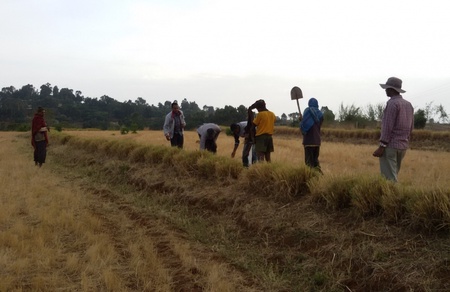The University of Aberdeen is leading an international collaboration of researchers in a £1,000,000 project that aims to improve land and soil degradation in Ethiopia, which affects over a quarter of the East African country.
Land degradation in Ethiopia is caused by a wide range of factors including deforestation and agricultural practices and affects the food security of nearly a third of the country’s 110 million population.
With climate change predicted to increase the risk of future loss, the Ethiopian Government has established specific ‘closed’ conservation areas where activities are restricted, to allow degraded land to recover. However, this practice mostly affects the poor in these communities as they depend on access to support their livelihoods.
In a bid to balance the needs of communities with effective land management, the Ethiopian Bureau of Agriculture is supporting the project involving researchers in Ethiopia, Sweden, and the UK.
The project - Reducing land degradation and carbon loss from Ethiopia's soils to strengthen livelihoods and resilience – is funded through a £1,000,000 grant from the UKRI Global Challenges Research Fund (GCRF). GCRF is a £1.5 billion fund supporting cutting-edge research and innovation that addresses the global issues faced by developing countries, and forms part of the UK Government’s ODA commitment.
The collaboration brings together world leading expertise in natural sciences, social sciences, economics and environmental systems modelling and involves Ethiopia’s Hawassa University and Southern Agricultural Research Institute, The International Water Management Institute, The James Hutton Institute, and The Swedish University of Agricultural Sciences.
Professor Euan Phimister, from the University of Aberdeen Business School, is coordinating the research. He said: “Land and soil degradation is a major problem in Ethiopia, and we will implement and evaluate various options to improve land conservation measures, including how benefits to local communities from closed conservation areas can be increased in a fair way while safeguarding soil conservation.”
Dr Wolde Mekuria, from the International Water Management Institute, explained: “The research will allow access to the closed conservation areas to certain groups who are typically excluded from the land, such as women and landless youth, and provide resources and training in activities that have a more positive impact on the land, such as bee-keeping.” Dr Mekuria added that if successful, the research would be ‘scaled-up’ so that the lessons learned could be applied elsewhere.
Getahun Edo, Director of Natural Resources from the Southern Agricultural Research Institute, said the project also involves other important options to decrease degradation. “We will also be showing local farmers how to improve their soil fertility increasing productivity and reducing land degradation,” he added.
Dr Awdenegest Moges from Hawassa University said: “Ultimately this research is about addressing a major environmental hazard but doing it in a way that is fair for people.”
Professor Phimister added: “Addressing land degradation is an issue which cannot be addressed by a single approach or institution but needs different disciplinary perspectives and strong international partnerships. This project brings both these together.”


